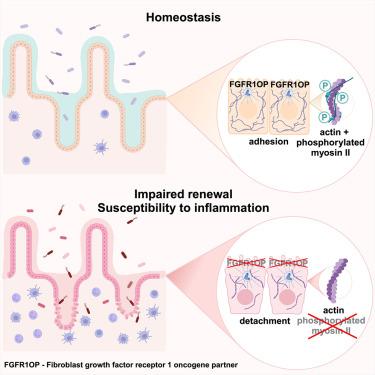Our official English website, www.x-mol.net, welcomes your
feedback! (Note: you will need to create a separate account there.)
The centrosomal protein FGFR1OP controls myosin function in murine intestinal epithelial cells
Developmental Cell ( IF 10.7 ) Pub Date : 2024-06-27 , DOI: 10.1016/j.devcel.2024.06.001 Tihana Trsan 1 , Vincent Peng 1 , Chirag Krishna 2 , Takahiro E Ohara 1 , Wandy L Beatty 3 , Raki Sudan 1 , Masahiro Kanai 2 , Praveen Krishnamoorthy 4 , Patrick Fernandes Rodrigues 1 , Jose L Fachi 1 , Gary Grajales-Reyes 1 , Natalia Jaeger 1 , James A J Fitzpatrick 5 , Marina Cella 1 , Susan Gilfillan 1 , Toru Nakata 2 , Alok Jaiswal 2 , Thaddeus S Stappenbeck 6 , Mark J Daly 7 , Ramnik J Xavier 2 , Marco Colonna 1
Developmental Cell ( IF 10.7 ) Pub Date : 2024-06-27 , DOI: 10.1016/j.devcel.2024.06.001 Tihana Trsan 1 , Vincent Peng 1 , Chirag Krishna 2 , Takahiro E Ohara 1 , Wandy L Beatty 3 , Raki Sudan 1 , Masahiro Kanai 2 , Praveen Krishnamoorthy 4 , Patrick Fernandes Rodrigues 1 , Jose L Fachi 1 , Gary Grajales-Reyes 1 , Natalia Jaeger 1 , James A J Fitzpatrick 5 , Marina Cella 1 , Susan Gilfillan 1 , Toru Nakata 2 , Alok Jaiswal 2 , Thaddeus S Stappenbeck 6 , Mark J Daly 7 , Ramnik J Xavier 2 , Marco Colonna 1
Affiliation

|
Recent advances in human genetics have shed light on the genetic factors contributing to inflammatory diseases, particularly Crohn’s disease (CD), a prominent form of inflammatory bowel disease. Certain risk genes associated with CD directly influence cytokine biology and cell-specific communication networks. Current CD therapies primarily rely on anti-inflammatory drugs, which are inconsistently effective and lack strategies for promoting epithelial restoration and mucosal balance. To understand CD’s underlying mechanisms, we investigated the link between CD and the FGFR1OP gene, which encodes a centrosome protein. FGFR1OP deletion in mouse intestinal epithelial cells disrupted crypt architecture, resulting in crypt loss, inflammation, and fatality. FGFR1OP insufficiency hindered epithelial resilience during colitis. FGFR1OP was crucial for preserving non-muscle myosin II activity, ensuring the integrity of the actomyosin cytoskeleton and crypt cell adhesion. This role of FGFR1OP suggests that its deficiency in genetically predisposed individuals may reduce epithelial renewal capacity, heightening susceptibility to inflammation and disease.
中文翻译:

中心体蛋白FGFR1OP控制小鼠肠上皮细胞中的肌球蛋白功能
人类遗传学的最新进展揭示了导致炎症性疾病的遗传因素,尤其是克罗恩病 (CD),这是一种重要的炎症性肠病。与 CD 相关的某些风险基因直接影响细胞因子生物学和细胞特异性通讯网络。目前的 CD 疗法主要依赖于抗炎药,这些药物的效果不一致,并且缺乏促进上皮恢复和粘膜平衡的策略。为了了解 CD 的潜在机制,我们研究了 CD 与编码中心体蛋白的 FGFR1OP 基因之间的联系。小鼠肠上皮细胞的 FGFR1OP 缺失破坏了隐窝结构,导致隐窝丢失、炎症和死亡。FGFR1OP不足阻碍了结肠炎期间的上皮恢复力。FGFR1OP对于保持非肌肉肌球蛋白 II 活性、确保肌动球蛋白细胞骨架和隐窝细胞粘附的完整性至关重要。FGFR1OP 的这种作用表明,它在遗传易感个体中的缺乏可能会降低上皮更新能力,增加对炎症和疾病的易感性。
更新日期:2024-06-27
中文翻译:

中心体蛋白FGFR1OP控制小鼠肠上皮细胞中的肌球蛋白功能
人类遗传学的最新进展揭示了导致炎症性疾病的遗传因素,尤其是克罗恩病 (CD),这是一种重要的炎症性肠病。与 CD 相关的某些风险基因直接影响细胞因子生物学和细胞特异性通讯网络。目前的 CD 疗法主要依赖于抗炎药,这些药物的效果不一致,并且缺乏促进上皮恢复和粘膜平衡的策略。为了了解 CD 的潜在机制,我们研究了 CD 与编码中心体蛋白的 FGFR1OP 基因之间的联系。小鼠肠上皮细胞的 FGFR1OP 缺失破坏了隐窝结构,导致隐窝丢失、炎症和死亡。FGFR1OP不足阻碍了结肠炎期间的上皮恢复力。FGFR1OP对于保持非肌肉肌球蛋白 II 活性、确保肌动球蛋白细胞骨架和隐窝细胞粘附的完整性至关重要。FGFR1OP 的这种作用表明,它在遗传易感个体中的缺乏可能会降低上皮更新能力,增加对炎症和疾病的易感性。































 京公网安备 11010802027423号
京公网安备 11010802027423号